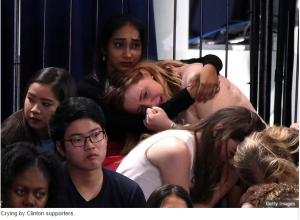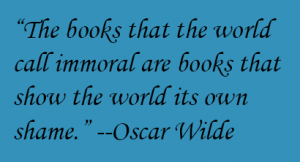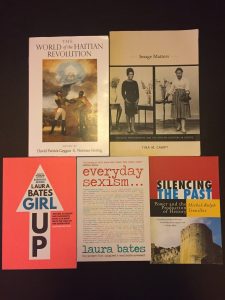When we started the semester discussing Publishing and threats to publishing, everyone was discussing Brexit. As an American, I recognized it as a threat, but I saw a threat on our horizon and so I too brought up a potential threat to Publishing… a Trump Presidency.  Everyone chuckled, not really believing that it was a possibility. If we are being honest, if I’m being honest with myself, I saw the writing on the wall about five months ago when Trump became the Republican Presidential candidate. America is a pendulum when it comes to its’ presidents and these past four years have driven the Republican party farther to the right.
Everyone chuckled, not really believing that it was a possibility. If we are being honest, if I’m being honest with myself, I saw the writing on the wall about five months ago when Trump became the Republican Presidential candidate. America is a pendulum when it comes to its’ presidents and these past four years have driven the Republican party farther to the right.
The day after the election, The Bookseller published as article titled “’Dismayed’ trade reacts to Donald Trump’s election” and I felt disgustingly vindicated. Trump’s presidency presents a threat to publishing just as it poses a problem to first amendment rights.People came up to me and gave me their condolences. We were all there at the funeral of America’s future, but this is not the first time we’ve felt that way about our country. Most felt the same fear upon George W. Bush’s election and re-election.This time the stakes are higher, this time people have more to lose. The LGBTQIA community has won so many victories in the past eight years and now we have elected a man whose vice president openly promotes conversion camps. Women have grown in their voices and intersectional feminism is steadily growing, but upon election night 53% of white women voted for Trump. Vice President Biden became a voice for a movement to bring an end to sexual assault and our President-elect has double digit accusations of sexual assault against him. This is truly a harrowing time in American history.
People are talking about a growth in anti-intellectualism with the election of Trump and all for which he stands. So, how can the publishing industry combat these new issues, well we can start by addressing the fact that these aren’t new issues at all, but a continuation of hate, ignorance, and fear. The lack of diversity is an issue that isn’t going away, because very few people are doing anything to stop it. By diversity, I don’t just mean the racial and economic disparities present in publishing, but the lack of diversity in topics. Heteronormativity in literature is an issue. Publishers are slowly coming out with more LGBTQ material, but most of it is produced by specialty publishers. Main publishers need to create more diverse content. We need main characters that are bisexual and state that they are bisexual.  What is bisexual? Authors need to write their characters with well-informed notions. The authors don’t need to be LGBTQ themselves but they need to know what they are talking about. People need to start understanding what feminism actually means, not just saying femi-nazi or assuming that its about women being better than men. We need to be explicit in our definitions and not leave anything up to interpretation. We need more characters that are people of color. We need POC’s to be described as human beings, not using food metaphors to describe the color of their skin. We need characters to understand and accept differences between cultures and have discussions about religion. We need literature (from YA to hyper-intellectualism) to be an inspiration and a source of accurate information. We need literature to build the bridges that real world conversations are failing at addressing. We need to be a strong global community that lifts each other up, that allows for a safe place fo minorities to escape into, and we need to never forget that fear and hate are founded in ignorance. Books disperse information and create worlds that give hope. We need hope in these next four years and the publishing industry needs to be at the heart of a movement to dispel misinformation, bigotry, and xenophobia. It has never been more important than it is now that we, as publishers, look at what we publish as a moral and ethical paragon of information. Let us quell the tide of fear and hate with more inclusivity and more diversification.
What is bisexual? Authors need to write their characters with well-informed notions. The authors don’t need to be LGBTQ themselves but they need to know what they are talking about. People need to start understanding what feminism actually means, not just saying femi-nazi or assuming that its about women being better than men. We need to be explicit in our definitions and not leave anything up to interpretation. We need more characters that are people of color. We need POC’s to be described as human beings, not using food metaphors to describe the color of their skin. We need characters to understand and accept differences between cultures and have discussions about religion. We need literature (from YA to hyper-intellectualism) to be an inspiration and a source of accurate information. We need literature to build the bridges that real world conversations are failing at addressing. We need to be a strong global community that lifts each other up, that allows for a safe place fo minorities to escape into, and we need to never forget that fear and hate are founded in ignorance. Books disperse information and create worlds that give hope. We need hope in these next four years and the publishing industry needs to be at the heart of a movement to dispel misinformation, bigotry, and xenophobia. It has never been more important than it is now that we, as publishers, look at what we publish as a moral and ethical paragon of information. Let us quell the tide of fear and hate with more inclusivity and more diversification.
by Isabella Pioli
